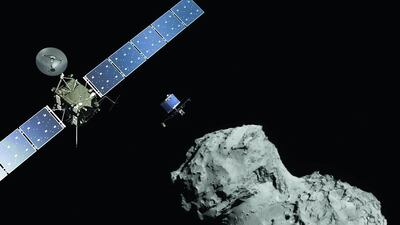"Pristání! Moje nová adresa: 67P! #CometLanding," read the Czech-language Twitter post on November 12 from the @philae2014 account. There would be 17 similar messages, in languages ranging from English to Russian to Greek, all making the same announcement of a triumphant arrival. The European Space Agency's lander Philae, having ventured 10 years and 6.4 billion kilometres from Earth, had indeed come to a new address, landing on top of a comet rotating in Jupiter's orbit commonly known as 67P.
The era of economic austerity had put a damper on space exploration; who could afford it? And weren’t there more necessary projects to be funded back on Earth? But Philae’s remarkable success – how do you land on a comet? – returned some of the wonder to a human project that had grown bogged down with talk of budgets and shrunken ambitions. We could journey to a comet, if we put our minds to it.
In a year of relentless bad news from Ukraine and Gaza and Syria and Ferguson and all points in-between, the return of space travel as a topic of jubilant conversation and general agreement was overwhelmingly welcome.
See all our Year in Review coverage
Weighed down by so many depressing terrestrial concerns, the idea of venturing deep into space and exploring the mysterious universe found renewed appeal in 2014. Space was one thing we could seemingly agree on, even when all else failed. At the height of the showdown between Russia and the United States over the downed Malaysian Airlines Flight 17, American astronauts hitched a ride on a Russian Soyuz spacecraft for the 402km return trip home from the International Space Station. With the shrinking of the American space programme, Russia is the only country currently in possession of a working space-taxi system.
The days of the space race as a component of the Cold War struggle between liberal democracy and communism, of Yuri Gagarin and Neil Armstrong, were long over, for better and for worse. Our ambitions to reach beyond the planet had shrunk; no human being has set foot on the Moon in more than 40 years. But the shifting of the spotlight also meant that international space collaboration could carry on even when governmental relations back on terra firma were at a low ebb.
Space exploration could also serve as a beacon of burgeoning national pride. Until 2014, only the US, the Soviet Union and the European Union had ever launched a projectile into Martian orbit. This year, they were joined by India, whose lightweight Mangalyaan, built for the bargain-basement cost of US$70 million (Dh257m, one-tenth the cost of the Maven, the American Mars orbiter), was successfully sent hurtling around Mars. (It, too, had a Twitter feed.) Mangalyaan is a reminder that not only can India compete with the superpowers, it can do it cheaper.
Philae’s success may pave the way for a renewed, if still constricted, era of space exploration. This month, Nasa successfully test-launched Orion, a capsule designed to hold astronauts, preparing for a proposed mission to Mars next decade. Orion’s success, venturing 13,223km above the Earth’s surface before setting itself down in the Pacific Ocean off the coast of California, raises hopes that the American space programme’s shrinking budgets, and shrinking missions, can be increased for a new mission to the Red Planet sometime in the future.
Still, not all the news from outer space this year was positive. Virgin Galactic, which had been prepping for commercial space travel, suffered a setback when a test flight crashed in the California desert, killing one of its pilots and injuring the other. Dozens of customers, who had paid up to $250,000 for the opportunity to fly into outer space one day, cancelled their theoretical flights beyond the Earth’s atmosphere, although hundreds of others chose not to. The idea of visiting space remains wildly alluring, even when potential travellers have to weigh the very real possibility of dying in transit.
For decades, we have been told that the era of flights to Mars as the new weekend jaunt to Paris was imminent. But space remains defiantly other. It is distant from human life, and human concerns. We have yet to make space ordinary, and perhaps this is how it should be. Flying a ship through space for a decade, making contact with a relatively minuscule comet and safely landing atop it is as far from the ordinary as humanly conceivable. Philae’s new address is only a temporary crash pad. In a few months, at most, 67P will move dangerously close to the sun, and Philae will likely be burnt to a crisp. But the idea of humankind having placed a marker of its own presence, and of its abiding curiosity about the shape and nature of our universe, so far from home is profoundly thrilling. We anxiously await Philae’s next electronic postcard.
Saul Austerlitz has been published in The New York Times, Los Angeles Times and the Boston Globe among other publications.

